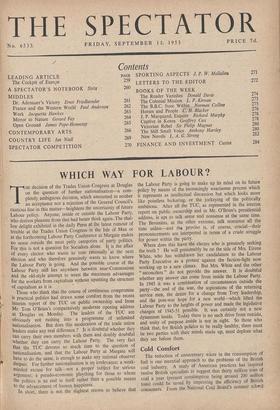WHICH WAY FOR LABOUR?
for the, workers from capitalism without upsetting the structure .., • of capitalism as it is.
Those who think that the course of continuous compromise is practical politics had drawn some comfort from the recent r interim report of the TUC on public ownership and from Mr. Tom O'Brien's comparatively moderate opening address at Douglas on Monday.. The leaders of the TUC are obviously not rushing into a programme of unlimited nationalisation. But does this moderation of the trade union leaders make any real difference ? It is doubtful whether they can carry their own members with them and doubly doubtful whether they can carry the Labour Party. The very fact that the TUC devotes so much time to the question of nationalisation, and that the Labour Party at Margate will have to do the same, is enough to make any rational observer despair. For further nationalisation is an irrelevance; a.weak- minded excuse for talk—not a proper subject for serious argument; a pseudo-economic plaything for those to whom the politics is an end in itself rather than a possible means _ to the advancement of human happiness.
In short, there is not the slightest reason to believe that the Labour Party is going to make up its mind on its future policy by means of the increasingly wearisome process which it represents as intellectual discussion but which looks more like pointless bickering, or the jockeying of the politically ambitious. After all the TUC, as represented in the interim report on public ownership and in Mr. O'Brien's presidential address, is apt to talk sense and nonsense at the same time. The Bevanites, at the other extreme, talk nonsense all the time unless—and the proviso is, of course, crucial—their pronouncements are interpreted in terms of a crude struggle for power within the party.
Where does this leave the elector who is genuinely seeking the truth ? He will presumably be on the side of Mrs. Eirene White, who has withdrawn her candidature to the Labour Party Executive as a protest against the faction-fight now working up to a new climax. But Mrs. White and the other " reconcilers " do not provide the answer. It is doubtful whether any answer can come from inside the Labour Party. In 1945 it was a combination of circumstances outside the party—the end of the war, the aspirations of the returning service men, the desire for a change from Tory leadership, and the post-war hope for a new world—which lifted the Labour Party to the heights of power and made the legislative changes of 1945-51 possible. It was certainly not a new dynamism inside. Today there is no such drive from outside, and unity of purpose inside is not in sight. So those who think that, for British politics to be really healthy, there must be two parties with their minds made up, must deplore what they see before them. -


































 Previous page
Previous page